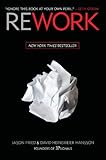 Rework (affiliate link) by Jason Fried and David Heinemeier Hansson was on the read eventually list, but it called out to me as it was waiting to be re-shelved on a cart at the library. I was already in the middle of too many other books, but that is the beauty of getting a book at the library–nothing lost if you aren’t able to read it. Before I knew it I was ripping through it.
Rework (affiliate link) by Jason Fried and David Heinemeier Hansson was on the read eventually list, but it called out to me as it was waiting to be re-shelved on a cart at the library. I was already in the middle of too many other books, but that is the beauty of getting a book at the library–nothing lost if you aren’t able to read it. Before I knew it I was ripping through it.
Rework is a fast, provocative read–most chapters are no longer than three pages and full page pictures separate each chapter. It made me yearn for a role at a small, nimble successful company, like this quote from the chapter “Less Mass,”
Huge organizations can take years to pivot. They talk instead of act. They meet instead of do. But if you keep your mass low, you can quickly change anything: your entire business model, product, feature set, and/or marketing message. You can make mistakes and fix them quickly. You can change your priorities, product mix, or focus. And most important, you can change your mind.
That isn’t to say that Red Hat is a huge company. It isn’t, though it is many times larger than the 650 people it was when I started. It is interesting to see process grow up around areas I always thought needed it and now to see places it has gone too far. Process can be wild vine that if not directed or pruned, keeps growing, and entangles itself in everything.
Another refreshing message of Rework was just enough process, structure, and people–erring just on the side of not having a enough and getting by instead of having too much and loosing the plot. This is a great book for any business that wants to be more successful, though the concepts are probably more easily applied in smaller settings.
How could you resist chapter titles like:
- Ignore the real world
- No time is no excuse
- Building to flip is building to flop
- Throw less at a problem
- Meetings are toxic
- Good enough is fine
- Make big tiny decisions
- Decommoditize your product
- Say no by default
- Don’t write it down
- Decisions are temporary
The chapters are short, snappy lessons on how to run an effective business, focus on what matters most, and move things forward.
Some of the comments on Amazon complain about it being a rehash of the Signal vs. Noise blog, which if it is, I wouldn’t know because I hadn’t previously followed their blog. Maybe I’ll feel that way about their next book, but even so it would probably still be a good read.

April 4, 2011 at 7:12 am
Great book, John- thanks for the recommendation!